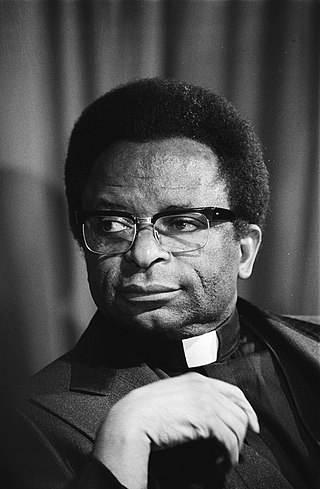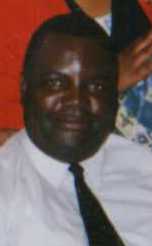Gift Tandare (died 2007) was a member of the Zimbabwe political party Movement for Democratic Change. He was shot dead by police at a prayer meeting. The government of Zimbabwe denied the family permission to bury him at Granville cemetery in Harare, fearing reprisals from mourners. He was buried at his rural home.
Simon Vengai Muzenda was a Zimbabwean politician who served as Deputy Prime Minister from 1980 to 1987 and as Vice-President of Zimbabwe from 1987 to 2003 under President Robert Mugabe.

Abel Tendekayi Muzorewa, also commonly referred to as Bishop Muzorewa, was a Zimbabwean bishop and politician who served as the first and only Prime Minister of Zimbabwe Rhodesia from the Internal Settlement to the Lancaster House Agreement in 1979. A United Methodist Church bishop and nationalist leader, he held office for less than a year.

The Zimbabwe men's national cricket team, also known as the Chevrons, represents Zimbabwe in men's international cricket and is overseen by Zimbabwe Cricket. Zimbabwe has been a Full Member of the International Cricket Council (ICC) since 1992. As of May, 2023, Zimbabwe was ranked 10th in Tests, 11th in One Day Internationals (ODIs) and 11th in Twenty20 internationals (T20Is) by the ICC.

Oliver "Tuku" Mtukudzi was a Zimbabwean musician, businessman, philanthropist, human rights activist and UNICEF Goodwill Ambassador for Southern Africa Region.

Witness Pasichigare Magunda Mangwende was a Zimbabwean politician who served as head of several government ministries in the Mugabe administration, diplomat, and as provincial governor for Harare.
The Kingdom of Mapungubwe was a medieval state in South Africa located at the confluence of the Shashe and Limpopo rivers, south of Great Zimbabwe. The name is derived from either TjiKalanga and Tshivenda. The name might mean "Hill of Jackals" or "stone monuments". The kingdom was the first stage in a development that would culminate in the creation of the Kingdom of Zimbabwe in the 13th century, and with gold trading links to Rhapta and Kilwa Kisiwani on the African east coast. The Kingdom of Mapungubwe lasted about 140 years, and at its height the capital's population was about 5000 people.
The Jews of Rusape, Zimbabwe are a group of people who practice a religion similar to Judaism. Their observance of Judaism is generally in accordance with that of mainstream Judaism practiced in other countries with the exception of a few key aspects. The Rusape Jews believe that although Jesus was not the Messiah, he was a prophet. They believe that he did not rise to heaven as is taught in Christianity, but was rather buried in Israel as a regular man. The community's origins are attributed to an individual known as William S. Crowdy, who came to the community in the late 19th or early 20th century.

Joseph Wilfred Msika, was a Zimbabwean politician who served as Second Vice-President of Zimbabwe from 1999 to 2009.

Moven Enock Mahachi served as the Minister of Defence of the Republic of Zimbabwe. He was a close ally of Robert Mugabe within Z.A.N.U.-P.F. Before becoming Defence Minister Mahachi served as M.P. for Makoni West.
Fletcher Dulini Ncube was a Zimbabwean politician who served as the Member of Parliament for Lobengula-Magwegwe. He was born at the Hope Fountain Mission in Zimbabwe on January 9, 1940.
Godfrey Guwa Chidyausiku was a Zimbabwean judge and politician. He was involved in politics during Rhodesia's unilaterally declared independence, being a member of the Rhodesian House of Assembly.
Amos Bernard Muvengwa Midzi was a Zimbabwean politician who served in the Cabinet successively as Minister of Energy and Power Development and Minister of Mines and Mining Development from 2002 to 2009.

Robert Gabriel Mugabe was a Zimbabwean revolutionary and politician who served as Prime Minister of Zimbabwe from 1980 to 1987 and then as President from 1987 to 2017. He served as Leader of the Zimbabwe African National Union (ZANU) from 1975 to 1980 and led its successor political party, the ZANU – Patriotic Front (ZANU–PF), from 1980 to 2017. Ideologically an African nationalist, during the 1970s and 1980s he identified as a Marxist–Leninist, and as a socialist during the 1990s and the remainder of his career.
Senator Chief Rekayi Tangwena was a traditional chief from Zimbabwe's eastern province of Manicaland, and was of the Nhewa/Simboti totem (leopard). He was also a member of Zimbabwe's first parliament.

Sikandar Raza Butt is a Pakistani-born Zimbabwean international cricketer. He is an all-rounder, who bats right-handed and bowls right arm off-spin. He made his international debut for Zimbabwe in May 2013.

Canaan Sodindo Banana was a Zimbabwean Methodist minister, theologian, and politician who served as the first President of Zimbabwe from 1980 to 1987. He was Zimbabwe's first head of state after the Lancaster House Agreement that led to the country’s independence. In 1987, he stepped down as President and was succeeded by Prime Minister Robert Mugabe, who became the country's executive president. In 1997, Banana was accused of being a homosexual, and after a highly publicised trial, was convicted of 11 counts of sodomy and "unnatural acts", serving six months in prison.

Sibusiso Busi Moyo was a Zimbabwean politician and army Lieutenant general. He was noted for announcing the ousting of Robert Mugabe on national television during the 2017 Zimbabwean coup d'état. He went on to serve as Minister of Foreign Affairs and International Trade in the cabinet of Emmerson Mnangagwa from November 2017 until his death.
Rabbi Curtis E Cassell, born Kurt Kassell, was a rabbi in Germany, the United Kingdom and Rhodesia. He came to the United Kingdom in 1939 as a refugee from Nazi Germany and became a British citizen in 1946.
Joseph Luke Culverwell (1918–1993) was a South African-born Zimbabwean politician and psychologist. Between 1981 and January, 1988, Culverwell was the Deputy Minister of Education and Culture of the Republic of Zimbabwe. In January 1988, he was appointed to the Minister of State in the President’s Office responsible for National Scholarships until 1992 when, for a brief period, he became the Deputy Minister of Higher Education.
Njini Ntuta was a Zimbabwe African People's Union (ZAPU) politician. He was deputy minister of mines in the first post-independence government but was sacked by President Robert Mugabe in a 1982 purge of ZAPU politicians. Ntuta was assassinated by members of the security forces acting on the orders of Colonel Flint Magama in 1984. At the time Mugabe's government blamed the murder on anti-government dissidents.